#jonathan rée
Explore tagged Tumblr posts
Text
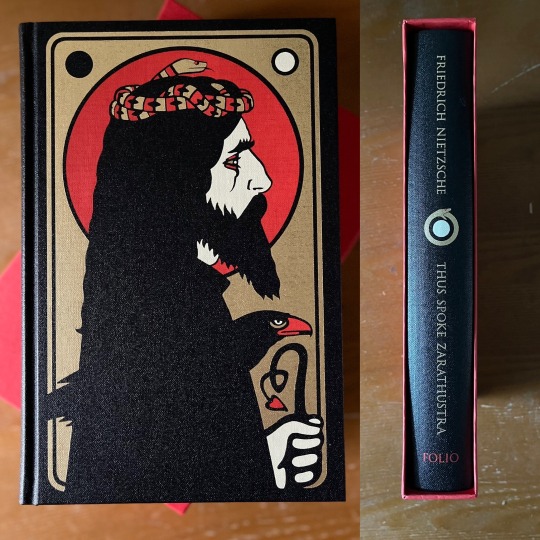
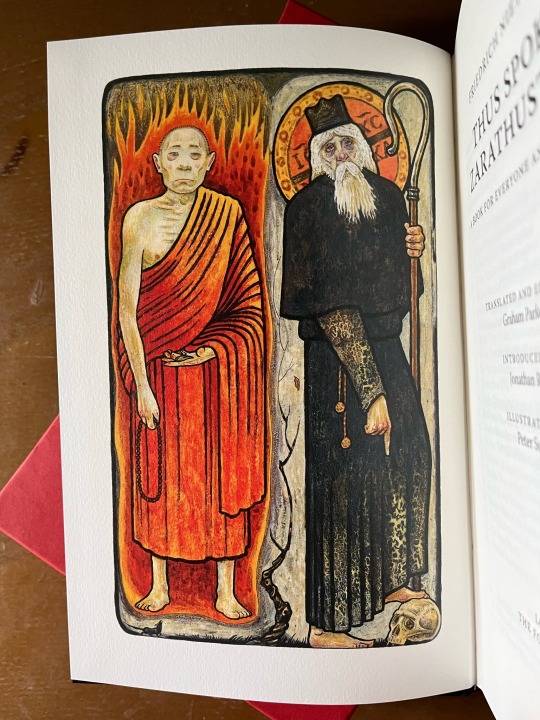
“Oh my brothers, whoever is a firstborn is always sacrificed. But now we are the firstborns.
We all bleed on secret sacrificial altars; we all burn and broil in honor of old idols.
Our best is still young; that tempts old gums. Our flesh is tender, our hide is mere lambskin - how could we not tempt old idol priests!
Even in ourselves he still lives, the old idol priest, who roasts up our best for his banquet. Oh my brothers, how could firstborn not be sacrifices!
But our kind wants it so; and I love those who do not want to preserve themselves. Those who are going under I love with my whole love: because they are going over. - “ On Old and New Tablets (6)
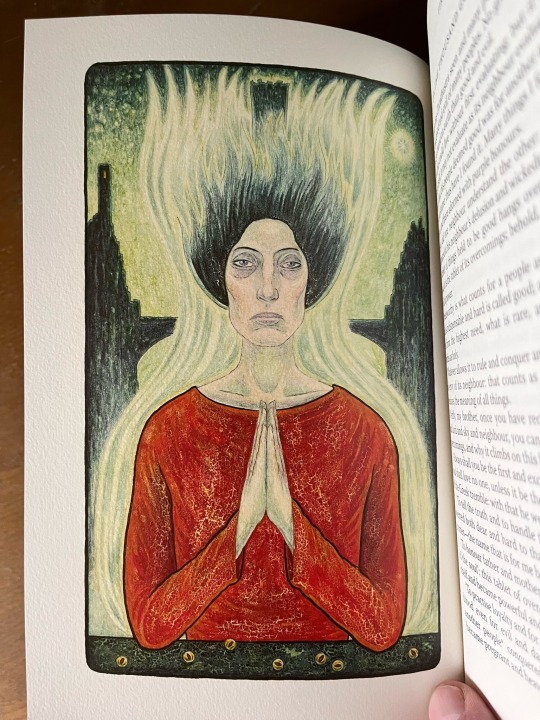
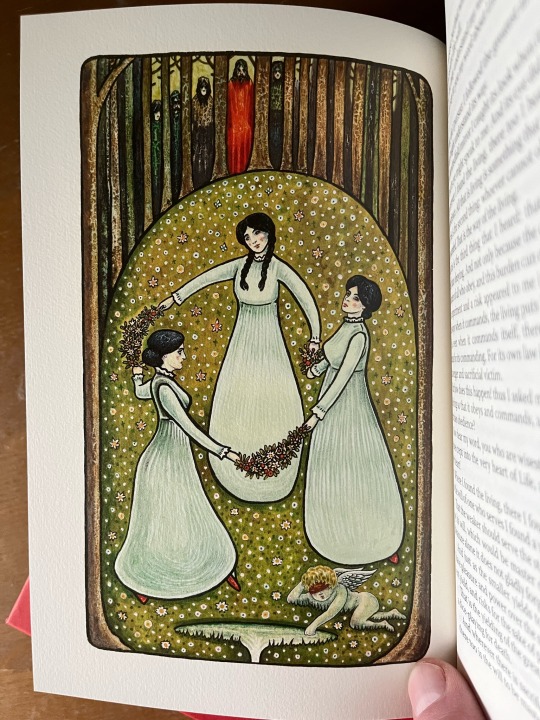
“Oh my brothers, I consecrate and conduct you to a new nobility: you shall be my begetters and growers and sowers of the future -
- to be sure, not to a nobility that you could buy like the shopkeepers and with shopkeepers' gold, for everything that has a price has little value.
Not where you come from shall constitute your honor from now on, but instead where you are going! Your will and your foot, which wants to go over and beyond yourself - let that constitute your new honor!
Certainly not that you served a prince - what do princes matter anymore! Or that you became a bulwark for what stands, to make it to stand more firmly!
Not that your kinfolk became courtiers at court, and learned to stand long hours like a colorful flamingo in shallow ponds.
- For being able to stand is a merit among courtiers; and all courtiers believe that part of blessedness after death is - being allowed to sit!
Nor that a spirit they called holy led your forefathers to promised lands, which I do not praise; because where the worst of all trees grew, the cross - there is nothing to praise about that land!
And truly, wherever this "holy ghost" led its knights, in such crusades goats and geese and pious crisscrossing contradictors ran in front!
Oh my brothers, your nobility should not look back, but out there! You should be exiles from all father- and forefatherlands!
You should love your children's land; let this love be your new nobility - the undiscovered land in the furthest sea! For that land I command your sails to seek and seek!
You should make it up in your children that you are the children of your fathers; thus you should redeem all that is past! This new tablet I place above you!” On Old and New Tablets (12)
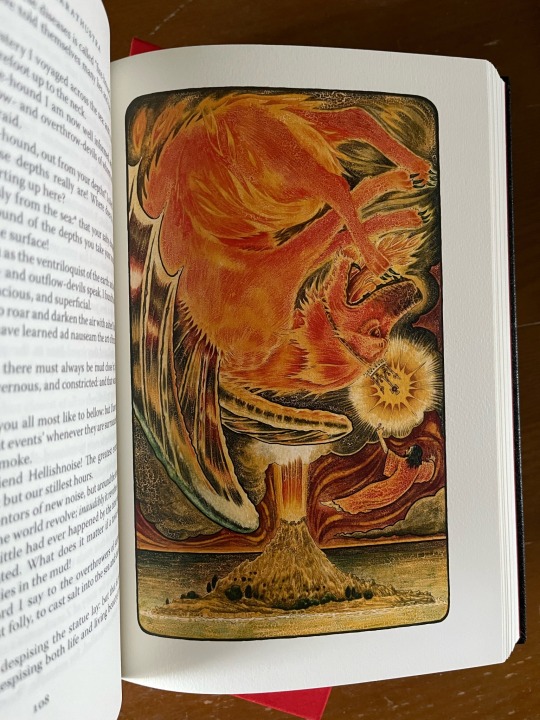
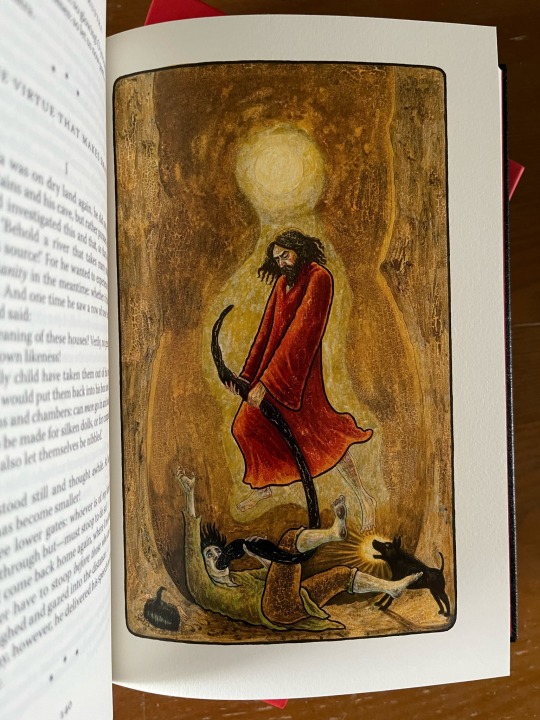
“My brothers! In whom does the greatest danger lie for all of future humanity? Is it not in the good and the just?
- is it not in those who speak and feel in their hearts: "We already know what is good and just, and we have it too; woe to any who still search here!"
And whatever harm the evil may do, the harm of the good is the most harmful harm!
And whatever harm the world slanderers may do, the harm of the good is the most harmful harm!
My brothers, there was a man who once looked into the hearts of the good and the just, and he spoke: "They are pharisees." But he was not understood.
The good and the just themselves were not permitted to understand him: their spirit is imprisoned in their good conscience. The stupidity of the good is unfathomably clever.
But this is the truth: the good must be pharisees - they have no choice!
The good must crucify the one who invents his own virtue! This is the truth!
The second one, however, who discovered their land, the land, hearts and soil of the good and just: he was the one who asked: "Whom do they hate the most?"
The creator they hate the most; he who breaks tablets and old values, the breaker - him they call the lawbreaker.
Because the good, you see - they can not create: they are always the beginning of the end -
- they crucify the one who writes new values on new tablets, they sacrifice the future to themselves - they crucify all future humanity!
The good - they were always the beginning of the end. - “ On Old and New Tablets (26)
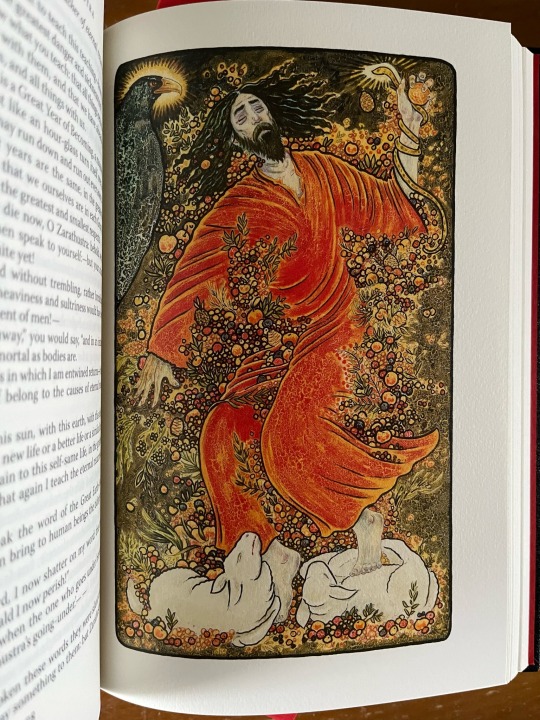
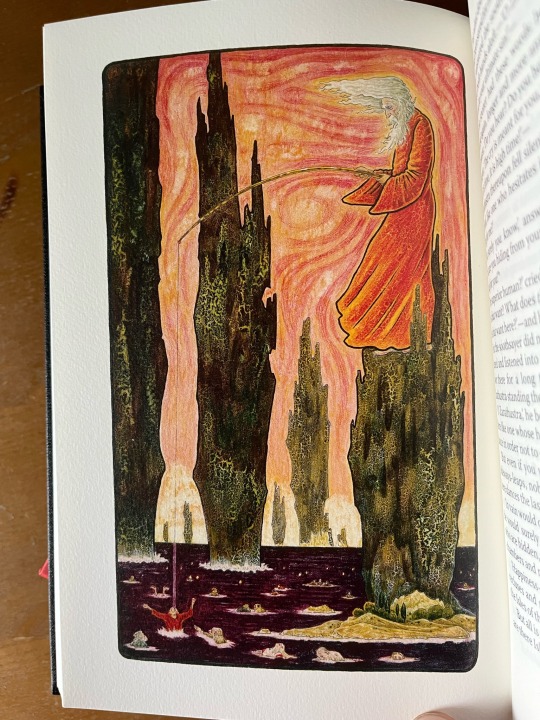
“"Why so hard!" - the kitchen coal once said to the diamond. "Are we not close relatives?"
Why so soft? Oh my brothers, this I ask you: for are you not - my brothers?
Why so soft, so retiring and yielding? Why is there so much denying and denial in your hearts? And so little destiny in your gazes?
And if you do not want to be destinies and inexorable, how could you triumph with me?
And if your hardness does not want to flash and undo and cut through, how could you one day create with me?
The creators are hard after all. And it must seem like bliss to you to press your hand upon millennia as if upon wax -
- bliss to write upon the will of millennia as if upon bronze - harder than bronze, more noble than bronze. Only the most noble is perfectly hard.
This new tablet, my brothers, I place above you: become hard! - “ On Old and New Tablets (29)
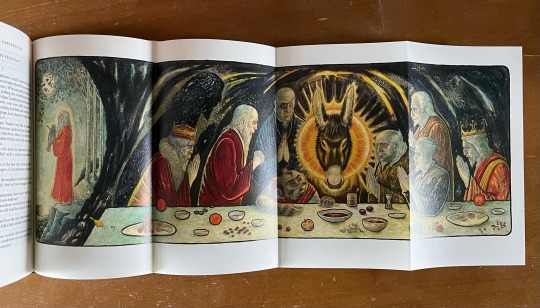
#nietzshe#friedrich nietzsche#thus spoke zarathustra#also sprach zarathustra#zarathustra#folio#folio society#peter stuart#graham parkes#jonathan rée#book#book lover
5 notes
·
View notes
Text
Self-transformation for Transcendence and Enjoyment
Photo: Jacek Stankiewicz, Kraków, Poland. The Comedy Wildlife Photography Awards 2023. So, here you are. How’d that happen? Did a little bird send you? A Philosophy of Enjoyment? You’re kidding, right? Sounds like an excuse to misbehave (think salacious and audacious), but then, maybe you are depressed or anxious or flummoxed by existence or know someone who is, so you did a Google search…

View On WordPress
#Aristotle#Don vs Lightning#Enya#Epictetus#Epicurus#Eudomania#good life#Jacek Stankiewicz#Jonathan Rée#OK Go#paradise#Peter Mullan#Spinoza#The Comedy Wildlife Photography Awards 2023.#The New Yorker#transcendence#Trump#Vladimir Putin
1 note
·
View note
Text
Oddballs of English Philosophy: Witcraft: The Invention of Philosophy in English by Jonathan Rée
Oddballs of English Philosophy: Witcraft: The Invention of Philosophy in English by Jonathan Rée
“Despite the disarming glee of this intellectual romp, [Jonathan] Rée doesn’t quite banish the thought that, for the English, philosophy is what history was to Henry Ford, bunk — a notion clinched by T.S. Eliot’s portrait of Bertrand Russell as Mr Apollinax, wittering incomprehensibly and laughing like an irresponsible foetus at his own wit.”
https://www.amazon.com/Witcraft/dp/0713999330/ref=pd_s…
View On WordPress
0 notes
Text
Happy Birthday, Baruch Spinoza!

Portrait of Baruch de Spinoza (1632-1677), ca. 1665, by an unknown artist
Baruch Spinoza was born on November 24, 1632, in Amsterdam, the Netherlands. He was the son of Michael and Hannah Spinoza, Portuguese Jews who had been forced to convert to Christianity, then imprisoned and tortured by the Inquisition, then fled to relatively tolerant Amsterdam. The Spinozas became successful and respected…
View On WordPress
#Atheism#Baruch Spinoza#Benedict de Spinoza#Blake D. Dutton#Dutch Jew#Harold Bloom#Jewish Philosophy#John Cottingham#Jonathan Rée#Melvin Bragg#Patheism#Rebecca Goldstein#Religious Skepticism#Richard H. Popkin#Sarah Hutton#Spinoza
0 notes
Photo

Just came upon this passage in Jonathan Rée’s excellent new work ‘Witcraft’. I’m just very much afraid that the good people of Rotterdam are going to be very much upset to read about “Desiderius Erasmus of Amsterdam…” 🤭 (at Manhattan, New York) https://www.instagram.com/p/CRr4XQ3p4dX/?utm_medium=tumblr
0 notes
Photo

Witcraft: The Invention of Philosophy in English
Jonathan Rée
An ambitious new history of philosophy in English that broadens the canon to include many lesser-known figures
Ludwig Wittgenstein once wrote that “philosophy should be written like poetry.” But philosophy has often been presented more prosaically as a long trudge through canonical authors and great works. But what, Jonathan Rée asks, if we instead saw the history of philosophy as a haphazard series of unmapped forest paths, a mass of individual stories showing endurance, inventiveness, bewilderment, anxiety, impatience, and good humor?
Here, Jonathan Rée brilliantly retells this history, covering such figures as Descartes, Locke, Kant, Hegel, Marx, Nietzsche, Mill, James, Frege, Wittgenstein, and Sartre. But he also includes authors not usually associated with philosophy, such as William Hazlitt, George Eliot, Darwin, and W. H. Auden. Above all, he uncovers dozens of unremembered figures—puritans, revolutionaries, pantheists, feminists, nihilists, socialists, and scientists—who were passionate and active readers of philosophy, and often authors themselves. Breaking away from high-altitude narratives, he shows how philosophy finds its way into ordinary lives, enriching and transforming them in unexpected ways.
0 notes
Text
a few favourite LRB pieces
The London Review of Books has been a good companion to me, its prose crisp and clean and sometimes lyrical, its horizons broad. And while it's often a little too political, too much on its sleeve – which hinders the analytical power of some of the more polemical pieces – I was a happy subscriber for years and recommend it to anybody.
For the next month, the website's paywall will be down and everything will be free. I figured I'd use this opportunity to link to a few pieces that I've read, enjoyed, not forgotten, or otherwise found interesting.
You could start with Hitchens on Ignatieff on Berlin, Meany on Schlesinger Jr., or Williams on Parfitt. Two pieces by the philosopher Amia Srinivasan, one on octopodes and consciousness, the other on politics and sexual desire are insightful and elegant. Jeremy Waldron, as ever, writes extraordinarily well on the shape and character of a politics given by a country's constitution, and the tradeoffs (tradesoff?) involved.
David Runciman is a regular contributor, and always interesting: on David Cameron and the 2016 referendum; on Theresa May; on Trump; on Obama; on Gordon Brown; and on artificial intelligence. Jonathan Rée wrote on James Harris's Hume, and on Edwin Curley's Spinoza. I've enjoyed articles on punishment and race in America, on Entick v. Carrington, and Geoffrey Hawthorn's reflections on my favourite philosopher, Bernard Williams.
There are three interesting pieces on antisemitism, zionism, Israel, its government, and the relations between all of the above; though none, in my opinion, quite understand the relevant problems, or render with enough subtlty the range of opinions amongst diasporic Jews –– and the dangers of getting the answers wrong. (Relatedly, Ido Vock's piece in Vice is the best article on this subject that I've ever read.)
The LRB occasionally jumps to and revives older texts, like this review of my favourite Iris Murdoch novel, Under The Net. And sometimes it doesn't review texts at all, but instead tells contemporary people's stories.
Finally, the blogs, which always remain free, are also worth exploring. There's a piece on Finnis, homosexuality, and academic freedom by Sophie Smith, which helped me see into a blind spot of my liberalism. Or there's this piece on Landmines in the Sahara by an old acquaintance of mine, Matthew Porges; his piece on Killing a Camel is also good. Srinivasan also wrote a short obituary on Parfitt, which is charming.
0 notes
Photo

Oddballs of English Philosophy: Witcraft: The Invention of Philosophy in English by Jonathan Rée Sounds like an interesting read. Philosophy does seem to have different connotations in different languages/cultures.
0 notes
Text
New top story on Hacker News: Witcraft by Jonathan Rée and the History of Philosophy by AC Grayling
Witcraft by Jonathan Rée and the History of Philosophy by AC Grayling 4 by Hooke | 0 comments from Blogger http://bit.ly/2EUMZDf
0 notes
Photo

Witcraft by Jonathan Rée and the History of Philosophy by AC Grayling http://bit.ly/2ERf2Du
0 notes
Photo

Photo via
Translating complex philosophical ideas onto the stage can be a challenge, particularly when that stage doesn’t involve words, but The National Ballet of Canada’s Being and Nothingness, based on the work by Jean-Paul Sartre, offers a riveting expression of the ideas around the nature of existence, done with a definite visual poetry that makes for compelling watching.
Reference: https://www.theoperaqueen.com/2015/05/31/beautiful-nothingness/
Sartre's Works
Psychology of the Imagination (1972) transl. Bernard Frechtman, Methuen, London.
Sketch for a Theory of the Emotions (1971) transl. Philip Mairet, Methuen, London.
The Transcendence of the Ego: An Existentialist Theory of Consciousness (1957) transl. and ed. Forrest Williams and Robert Kirkpatrick, Noonday, New York.
Being and Nothingness: An Essay on Phenomenological Ontology (1958) transl. Hazel E. Barnes, intr. Mary Warnock, Methuen, London (abbreviated as BN above).
Existentialism and Humanism (1973) transl. Philip Mairet, Methuen, London.
Critique of Dialectical Reason 1: Theory of Practical Ensembles (1982) transl. Alan Sheridan-Smith, ed. Jonathan Rée, Verso, London.
The Problem of Method (1964) transl. Hazel E. Barnes, Methuen, London.
Commentaries
Caws, P. (1979) Sartre, Routledge and Kegan Paul, London.
Danto, A. C. (1991) Sartre, Fontana, London.
Howells, C. (1988) Sartre: The Necessity of Freedom, Cambridge University Press, Cambridge.
Howells, C. ed. (1992) Cambridge Companion to Sartre, Cambridge University Press, Cambridge.
Murdoch, I. (1987) Sartre: Romantic Rationalist, Chatto and Windus, London.
Natanson, M. (1972) A Critique of Jean-Paul Sartre's Ontology, Haskell House Publishers, New York.
Schilpp, P. A. ed. (1981) The Philosophy of Jean-Paul Sartre, Open Court, La Salle.
Silverman, H. J. and Elliston, F.A. eds. (1980) Jean-Paul Sartre: Contemporary Approaches to his Philosophy, Harvester Press, Brighton.
0 notes
Text
Review: Witcraft by Jonathan Rée and The History of Philosophy by AC Grayling
Review: Witcraft by Jonathan Rée and The History of Philosophy by AC Grayling
“Whereas Rée shows how religion and political radicalism can strike up fruitful alliances, the briskly rationalist Grayling refuses the title of philosophy to any view of the world that involves religious faith… The difference between them is clear from their writing. Rée is entertaining and stylish, Grayling is lucid but lifeless.” Book Review by Terry Eagleton in The Guardian.
https://www.amaz…
View On WordPress
0 notes
Photo




Interview on Found Monochromes - David Batchelor & Jonathan Rée
Some amazing comments made by both interviewer and interviewee. ‘Freakish Absences’ / ‘Apotheosis of Abstract Art’ / ‘Cutting a hole in the visual field’ etc
0 notes
Text
"The chapters that follow do not remain bound by the esoteric confines of such terms and positions as Ong’s and Derrida’s. Instead, they step outside this debate, to the extent that it still is one, to consider the more palpable questions of how Victorians interpreted sound in newly amplified forms..."
you can SMELL the smugness radiating off of this sentence and yet the oh-so-enlightened third position that he (of course this is a man, lol) offers [“Yet when set against a broader canvas, as Jonathan Rée writes, these debates can seem ‘actually rather inane.’ They ignore a third position, which maintains ‘that the aural and written modes of language are equivalent but simply differ, both deriving from the ontologically prior nature of language itself’”] is in fact very much not outside of this debate. & the idea that language has any kind of abstract existence that’s “ontologically prior” to anything & exists in any way outside of its actual instantiations in spoken OR written language is an idea that most linguists have been moved away from for like, 40 years.
also "On the other hand, there are those such as the poststructuralist Jacques Derrida, who effectively banished voice and sound to the lower depths of much literary critical work by emphasizing the grammatological qualities of language, the sense that nothing is outside of or separable from its written text" idk if this is a competent summary? of course other people’s writing seems simplistic if you........ oversimplify it
hate academics who smugly act like they’re above and outside of debates whose implications you can tell are in fact influencing their thinking
46 notes
·
View notes
Text
Iris Mittenaere élue Miss Univers : sa mère, pas si heureuse...

Ce lundi 30 janvier, à Manille, elle a vécu l'un des plus beaux moments de sa vie. Iris Mittenaere a été élue Miss Univers après avoir remporté successivement les écharpes de Miss Nord-Pas-de-Calais et Miss France. À 24 ans, la jeune femme s'apprête donc à faire le tour du monde et à vivre une expérience absolument incroyable. Pas de quoi ravir sa maman, bien au contraire. Si Laurence Druart est évidemment extrêmement fière de sa poupée, étudiante en chirurgie dentaire, elle reste néanmoins très inquiète. Dans un entretien accordé au Parisien, la maman de Miss Univers se confie sur ses peurs : "Il va falloir que je digère, c’est un peu compliqué", lâche-t-elle dans un premier temps. Et de poursuivre : "Là, je viens de la voir encadrée par un service de sécurité maximum. C’est pire que pour un chef d’Etat. Heureusement, j’ai pu échanger avec les membres de l’organisation. Ça m’a rassurée. J’avais déjà eu beaucoup de mal après son élection de Miss France. C’est perturbant de la voir comme un personnage public. Certains se mettent à l’aduler comme si c’était une déesse. D’autres la perçoivent comme une créature extraterrestre. Certains tombent même dans les pommes en la voyant. C’est l’effet écharpe on va dire." C'est à New York que la sublime Iris va vivre un an durant. Elle aura un agenda chargé qui, malheureusement, risque de l'éloigner un peu de ses proches, notamment de son chéri, Matthieu. Jonathan Kung ... Retrouvez cet article sur Public
Vidéo : Iris Mittenaere : "C'est fou ! Je n'arrive pas à y croire, je suis Miss Univers ! "
Photos : Miss Univers 2017 : qui est Matthieu, le chéri d'Iris Mittenaere ?
Photos : Miss Univers 2016 : Iris Mittenaere en met déjà plein la vue en répétition !
Photos : Miss Univers 2017 : Revivez toutes les émotions de la soirée de l'élection d'Iris Mittenaere!
Miss Univers 2017 : Ultra sexy, Iris Mittenaere fait honneur à la France en meneuse de revue
1 note
·
View note
Link
Witcraft by Jonathan Rée and the History of Philosophy by AC Grayling 4 by Hooke | 0 comments on Hacker News.
0 notes